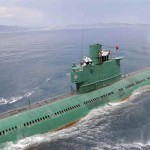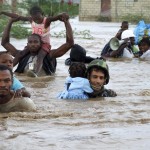- DETERRENCE: N. Korea conducts submarine missile ejection test: sources
- DPRK: North Korea warns U.S. about pre-emptive strike ‘if necessary’
- GOVERNANCE AND CIVIL SOCIETY: Small step by Tokyo district could be giant leap for LGBT equality
- CLIMATE CHANGE ADAPTATION: My country or my planet?
- CLIMATE CHANGE AND SECURITY: Climate-chaos migrants set to face increasingly closed borders
 DETERRENCE: N. Korea conducts submarine missile ejection test: sources, Grace Oh, Yonhap (20 February 2015)
DETERRENCE: N. Korea conducts submarine missile ejection test: sources, Grace Oh, Yonhap (20 February 2015)
The Washington Free Beacon reported that North Korea conducted a test flight of KN-11 submarine launched missile from a sea-based platform. ROK military sources say the test was near Sinpo South Shipyard on January 23, and that the objects from the launcher fell into the water after flying some dozen meters during the test. It was not a flight test.
- Silent but Deadly: Korea’s scary submarine arms race, Zachary Keck, The National Interest (13 February 2015)
- South Korea establishes submarine command, Yoo Kyong Chang, Erik Slavin, Stars and Stripes (3 February 2015)
 DPRK: North Korea warns U.S. about pre-emptive strike ‘if necessary’, Stephanie Nebehay, Reuters (3 March 2015)
DPRK: North Korea warns U.S. about pre-emptive strike ‘if necessary’, Stephanie Nebehay, Reuters (3 March 2015)
North Korea makes it increasingly difficult to separate noise from nuanced signal. North Korea’s Foreign Minister claims DPRK can deter the US with nuclear threats, North Korea’s forces fire rockets – signaling its displeasure with US-ROK military exercises, yet North Korea also invites foreigners to visit after lifting their self-imposed Ebola ban. As we’ve seen with past North Korean propaganda, the greatest danger is that North Korea believes what it tells itself, not that it is a rational actor. The best way to discern the true signal is to ask them.
- Propaganda, fire-thrashing, and the risk of North Korean first – use of nuclear weapons in Korea, Peter Hayes and Roger Cavazos, The Nautilus Institute for Security and Sustainability (11 April 2013)
- North Korea fires missiles into sea, Jeyup S. Kwaak, Wall Street Journal (1 March 2015)
- After four months, North Korea’s Ebola quarantine comes to an end, Anna Fifield, The Washington Post (2 March 2015)
 GOVERNANCE AND CIVIL SOCIETY: Small step by Tokyo district could be giant leap for LGBT equality, Elaine Lies, Reuters (3 March 2015)
GOVERNANCE AND CIVIL SOCIETY: Small step by Tokyo district could be giant leap for LGBT equality, Elaine Lies, Reuters (3 March 2015)
Tokyo’s Shibuya district will consider a proposal to recognize same-sex marriages, the first such proposal in Japan. The proposal has sparked debate, with Yokohama’s mayor considering following suit while the Prime Minister has questioned whether the Constitution would allow for recognition. The education ministry, meanwhile, has instructed schools to work to prevent bullying and discrimination against LGBT students.
- District in Tokyo plans to extend rights of gay couples, Martin Fackler, New York Times (12 February 2015)
- Japan’s gay marriage push faces constitutional barrier, Andy Sharp and Nao Sano, Bloomberg (19 February 2015)
- Ministry to require schools to support LGBT students, Yuki Nikaido, Asahi Shimbun (3 March 2015)
 CLIMATE CHANGE ADAPTATION: My Country or my planet? exploring the influence of multiple place attachments and ideological beliefs upon climate change attitudes and opinions, Patrick Devine-Wright, Jennifer Price and Zoe Leviston, Global Environmental Change, vol. 30, pp. 68-79 (January 2015) [589 KB, PDF]
CLIMATE CHANGE ADAPTATION: My Country or my planet? exploring the influence of multiple place attachments and ideological beliefs upon climate change attitudes and opinions, Patrick Devine-Wright, Jennifer Price and Zoe Leviston, Global Environmental Change, vol. 30, pp. 68-79 (January 2015) [589 KB, PDF]
Public engagement with climate change is an important policy topic, which needs to be examined through two questions: (1) how climate change attitudes and opinions relate to place attachments at both nearby and distant scales? and (2) what is the relationship between place attachments and ideological beliefs, specifically right wing authoritarianism and social dominance orientation, and how these influence climate change attitudes and opinions? It has been observed that global place attachment is prevalent amongst Australian adults, second only to national belonging, and significantly higher than attachment at the neighbourhood, city/town and state/territoryscales.
- Communicating climate science: evaluating the UK public‟s attitude to climate change, Duncan M. Sharples, Earth & Environment, vol. 5, pp. 185-205 (2010) [561 KB, PDF]
- The use of public engagement in tackling climate change, Briefing Paper, Ingrid Prikken, Simon Burall and Michael Kattirtzi, involve, pp. 1-7 (January 2011) [230 KB, PDF]
 CLIMATE CHANGE AND SECURITY: Climate-chaos migrants set to face increasingly closed borders, April Humble, openSecurity (2 March 2015)
CLIMATE CHANGE AND SECURITY: Climate-chaos migrants set to face increasingly closed borders, April Humble, openSecurity (2 March 2015)
Contradiction: “an unparalleled era of border securitisation”, “with more fortified borders than at any previous point in history”; yet “the nexus of climate change, migration, and conflict will test the U.S. and the world to manage global security in ways never thought of before.” Can a place for climate change in the National Security Strategy open up “notions of collective and human security” and rebalance “the three tools of foreign policy—defense, diplomacy, and development”?
- Climate change, migration, and conflict: addressing complex crisis scenarios in the 21st Century, Michael Werz and Laura Conley, Center for American Progress and Heinrich Böll Stiftung (January 2012) [PDF, 913KB]
- The Pentagon & climate change: how deniers put national security at risk, Jeff Goodell, Rolling Stone (12 February 2015)
- National Security Strategy 2015, The White House (February 2015) [PDF, 400KB]
The Nautilus Peace and Security Weekly Report presents articles and full length reports each week in six categories: Austral security, nuclear deterrence, energy security, climate change and security, the DPRK, climate change adaptation and governance and civil society. Our team of contributors carefully select items that highlight the links between these themes and the three regions in which our offices are found — North America, Northeast Asia, and the Austral-Asia region.
Subscribe to NAPSNet to receive free weekly email reports.
- Editor: Arabella Imhoff
Contributors:
- Deterrence: Peter Hayes
- DPRK: Roger Cavazos
- Governance and Civil Society: Dyana Mardon
- Climate Change Adaptation: Saleem Janjua
- Climate Change and Security: Richard Tanter

